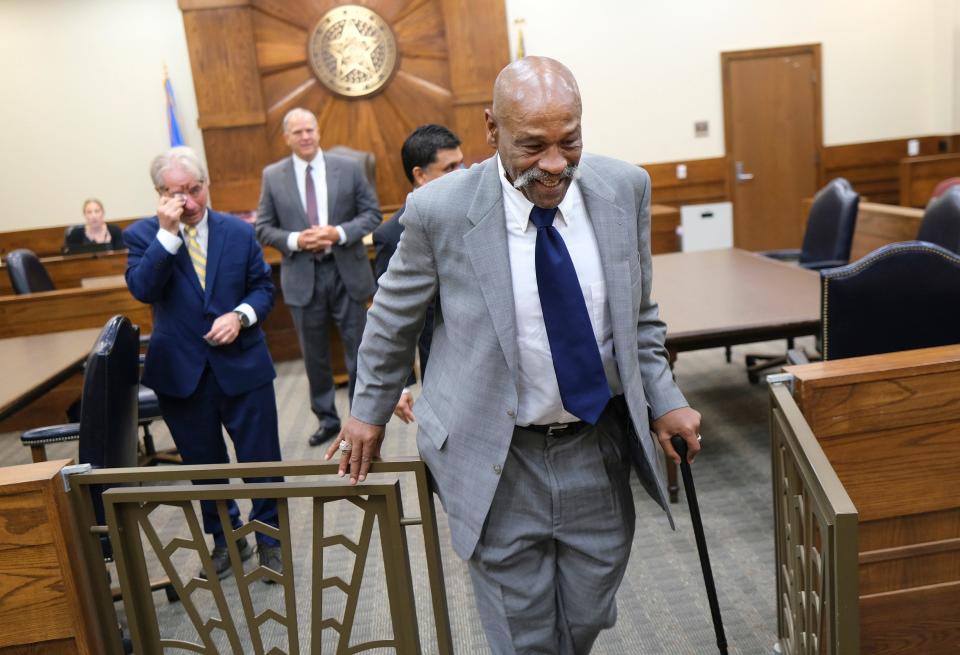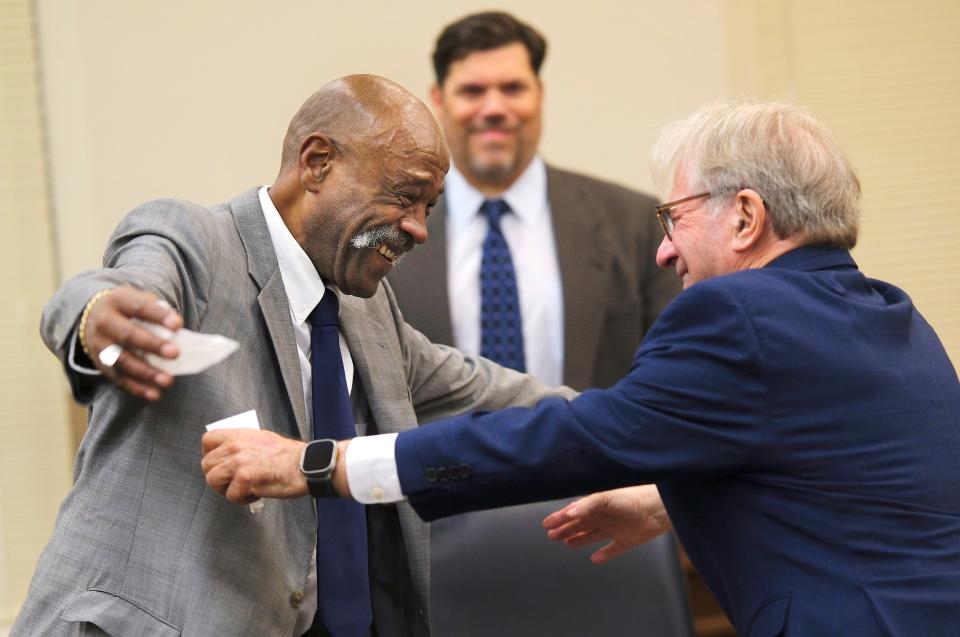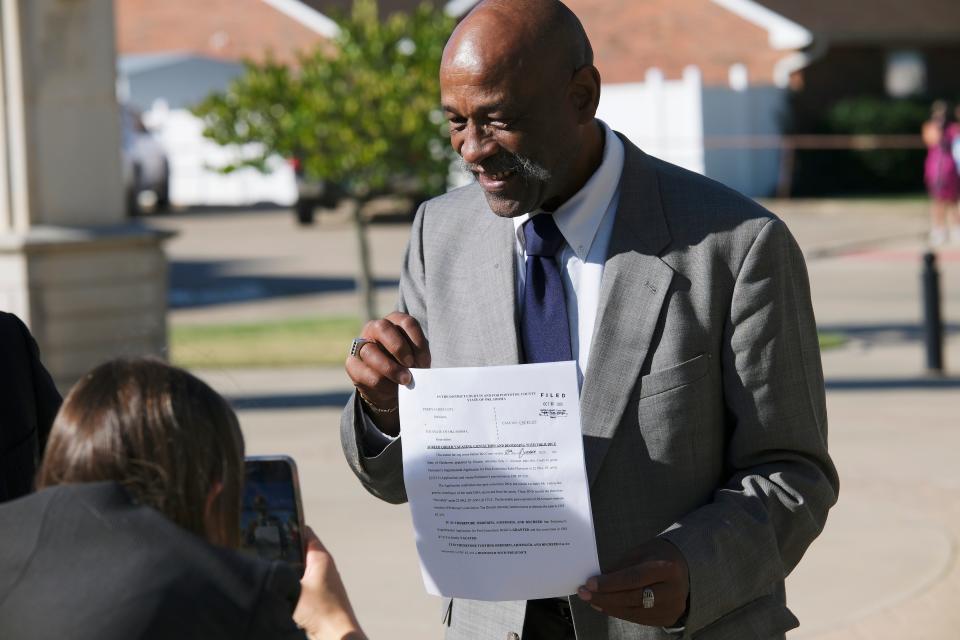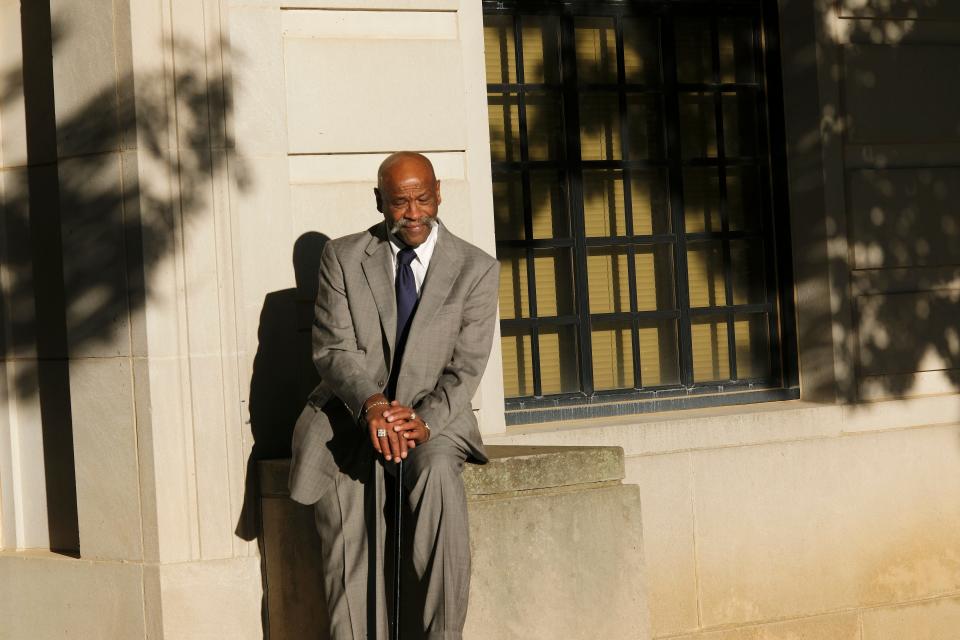'I feel exonerated': After 35 years, Oklahoma man's conviction vacated thanks to DNA
- Oops!Something went wrong.Please try again later.
ADA — A district judge ruled Tuesday to vacate the conviction of a man advocates say was wrongfully imprisoned in a 1987 rape case.
Perry Lott, 61, sought to have his conviction overturned after 2014 testing on DNA evidence from a rape kit excluded him as the source. His sentence was reduced to time served and he was released in July 2018, three decades after a jury trial convicted him of the rape and robbery of an Ada woman inside her home.
Tuesday morning Pontotoc County District Judge Steven Kessinger dismissed Lott's case "with prejudice," meaning the case can't be refiled. Lott is now officially considered a free man.
"I feel exonerated, vindicated, free," Lott told The Oklahoman. "I feel confident, a confidence I never had in 30-something years. So now I'm going to just start all over and become better and better every day."

More: I was wrongly convicted and sentenced to death. We need to do more to help exonerees.
Dismissal of Lott's conviction after two district attorneys' differing approaches
District Attorney Erik Johnson, for Pontotoc, Seminole and Hughes counties, agreed to vacate Lott's conviction Tuesday, saying he had reviewed the case and spoken with the victim since taking office in January.
"Numerous individuals within my office have been involved in reviewing the record, but at the end of the day, I must do what I believe the facts and the law require," Johnson said. "In my mind, the post-conviction DNA evidence was the pivotal fact. Pursuant to state statute, if post-conviction DNA testing is 'favorable' to the defendant then an appropriate remedy is vacating the judgment of the conviction. That's exactly what we did (Tuesday)."
Advocates with the Innocence Project, a national litigation and public policy organization dedicated to exonerating people, had requested the previous district attorney, Paul B. Smith, vacate Lott's conviction, but he would not. Smith instead cited Lott's poor health among the "humanitarian reasons" to release him from prison, arguing the test results could have been of contaminated DNA and that the victim had identified Lott during a police lineup because of his appearance and voice.

But the Innocence Project noted that the victim in a 2014 interview said, "I can't think of anything that overly stands out that made me select him. … I kept thinking, what if I chose the wrong one?"
Smith attracted nationwide criticism for previously declining to vacate Lott's conviction after Mississippi author John Grisham, known for his best-selling legal thrillers, publicly called for him to be voted out. Smith won the 2018 election but did not seek re-election in 2022.
"With a population of 18,000, Ada ranks as one of the worst places in the country for wrongful convictions, per capita," Grisham, a member of the Innocence Project's board of directors, said in a 2018 letter to the Ada News. "It's time to stop convicting innocent people."
Other Innocence Project officials, including co-founder Barry Scheck and senior staff attorney Adnan Sultan, said "there should be no doubt" of Lott's innocence.
"Mr. Lott has shown nothing but persistence and resilience in his 35-year-long pursuit of justice," Sultan said Tuesday. "He would not give up on proving his innocence. Five years ago, all evidence pointed to his innocence, but he was denied justice. We are grateful to District Attorney Erik Johnson for his commitment to righting this wrong."
Related: John Grisham-supported candidate loses Oklahoma DA race
Lott's conviction follows similar patterns as high-profile exonerated cases
Lott's conviction came around the same time as those of Tommy Ward and Karl Fontenot, whose Pontotoc County convictions in the murder of Donna Denice Haraway became the subject of heightened scrutiny after Grisham included them in his 2006 nonfiction novel "The Innocent Man," later adapted into a Netflix series.
Grisham's book also focused on the exonerations of Ron Williamson and Dennis Fritz, who were both wrongfully convicted of the 1982 killing of Debra Sue Carter in Ada. Fontenot, Fritz and Williamson were all eventually freed from prison, but Ward is still behind bars.
Scheck said these convictions involved the same prosecutors and police officers, but he said he was hopeful that "a new day in Ada" had arrived. He also said the Innocence Project would continue advocating for eyewitness procedure reforms that could avoid false identifications from suggestive police lineups.
"We've done a lot of work with scientific evidence, showing the kinds of things that will prevent mistaken identifications," Scheck said. "Procedures ... that would greatly reduce (misidentifications) without reducing correct identifications, so that's a win-win. We would love for the Legislature to do it, but police departments can voluntarily adopt these procedures."

Observers also have drawn strong parallels between Lott's case and the case of Glynn Simmons, another Oklahoma inmate who recently saw his murder conviction and life sentence vacated after 48 years in prison.
One of the lawyers representing Lott, Tulsa-based attorney Joe Norwood, also represents Simmons, and he told The Oklahoman he felt like he was experiencing "deja vu" over the similarities in the cases.
"These cases rob people like Perry of their earning lifetimes," Norwood said. "And when they get out, they don't have an education because that was taken from them. He doesn't have work experience, because that was taken from him. He needs help."
Related: Man freed after 48 years in Oklahoma prison seeks reform, compensation
Lott, who now lives in Oklahoma City, developed health issues while in prison that affect his ability to walk. Supporters hoped the public would donate to Lott's new GoFundMe so he could better afford medical expenses while he continues reintegrating into society.
"Up until this point, Perry's been officially a convicted felon of a heinous crime that he did not do, and that gets in the way of being able to be gainfully employed, find housing, all kinds of things," Norwood said. "He's gotten some help this far, but he needs more. He needs money."
Lott hopes to move on by leaning on faith, mentorship
In the meantime, Lott said he would move forward by helping others. Since his release in 2018, he has actively attended Skyline Church in Oklahoma City, and he told The Oklahoman he hopes to start a foundational "character and faith" program for young men, continuing the type of mentorship work he began while incarcerated.
Members of the church staff attended the hearing Tuesday in support of Lott.
"From the moment Perry started coming to Skyline Church, he's been one of the most joyful men I have ever met," said pastor Todd Lovelace. "And for me, I just couldn't wrap my head around how a man who's been wrongfully convicted and in prison for 31 years could be so full of joy. But that's what stands out to me when I think of Perry: a guy who just loves the Lord and loves the freedom and life that he's found, and his faith."

Cecily Burge, a 25-year-old post-conviction paralegal for the Innocence Project, noted similar qualities in Lott's behavior, describing him as her "greatest hero" whose "superhuman perseverance made this day possible."
"I think it speaks to his character after so much of his life was stolen, the only words he speaks are the words of grace and gratitude," Burge told The Oklahoman. "Representing him is the honor of a lifetime."
Sultan said so many years in prison nearly changed the outgoing Lott into a much more introverted person, but that his mentorship to troubled youth gave him renewed purpose and transformed him into a charismatic speaker.
"My 31 years in prison, I must have died 1,000 deaths," Lott said.
"But what inspired my motivation was not to prove anyone wrong, but to just work harder and harder to hold on to my truth," Lott told The Oklahoman. "It takes a lot longer to win that war, but that's why it's important that we stand for the truth, no matter what comes against us."
This article originally appeared on Oklahoman: Oklahoma man's conviction officially vacated through DNA testing

